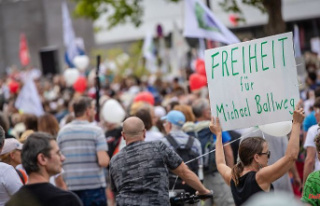Leipzig (dpa / sn) - The booth used to be full, now the audience of the Leipzig cabaret Sanftwut lacks the money. The corona pandemic has not been forgotten for a long time either. Many performances are therefore only half occupied - otherwise the times on the cabaret stage are different: "In all these crises you only have to give a slight hint, give a subtle hint, and the audience laughs - and much more aggressively than before," says Thomas Störel, who has been on stage together with his colleague Uta Serwuschok as Moni and Manni for decades. Those who come are there with all their hearts. Despite the empty ranks and depressing world situation, the audience is happy about the entertainment and enjoys the laughter.
The viewers are much better informed and involved in a completely different way, says Störel: "The valve is awesome, that's why they look forward to evenings in the cabaret." There were performances during which one clapped too loudly and the other laughed too loudly: "And then one of them hit the other loudly because he didn't share his opinion," says the teacher and cabaret artist. Because their everyday life is strongly influenced by political measures, everyone has an opinion on current topics, problems and politicians.
Laughter was good medicine, especially in times of crisis, says the director of the Leipzig Humor and Satire Festival, Harald Pfeifer. "Laughingly, stupid, bad, scary things can be dealt with without getting past the facts and without breaking it." For example, cabarets were popular in GDR times because things were said on stage that were otherwise not allowed to be said out loud.
There has always been a lot of ranting on the small stage and dreams of a world that doesn't exist like this, says Pfeifer. "In this respect, the catastrophe is actually the breeding ground for cabaret," says Pfeifer. Despite the difficult times, the Leipzig Laughter Fair in October therefore offers a good opportunity for daydreaming and laughing out loud.
The cabaret festival will take place for the 32nd time this year between October 16th and 23rd. According to Pfeifer, the focus of the event is on political cabaret. In addition, there are also poetry slams and songwriting on the program. Appearances by well-known stars of the scene, such as Anny Hartmann and Tom Pauls, are planned. According to Pfeifer, the aim of the trade fair is to present the diversity of the industry.












